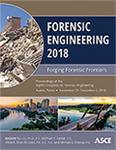Eighth Congress on Forensic Engineering
Graduate Course in Forensic Engineering via Distance Education
Publication: Forensic Engineering 2018: Forging Forensic Frontiers
ABSTRACT
This paper provides an overview of topics and delivery method of an innovative graduate level course focused on forensic engineering. The course provides graduate students practical insight into structural engineering practice and design through the examination of failures. The course is taught via a distance education format; that is, it is offered online in a real time synchronous format. Approximately half of the students are traditional in class students, while the other half are off campus, “distant learners”. During a given class meeting approximately half of the distant learners view/participate in real time while the others complete work at their convenience at another time. Forty-one, faculty prepared, case studies are examined with the examples ranging from infamous catastrophic collapses to little known examples of design criteria being violated. The case studies highlight the sequence of events that contributed to the engineering catastrophes and draw conclusions based on the evidence as to why these failures occurred and how they may have been prevented and what lessons were learned. Students are responsible for an on site investigation, either on campus or at a structure of their choosing, and a case study (presentation or report). This paper discusses the experience of the instructor over the 15-year development and execution of the course and the evolution to the current distance education version. Additionally, the paper provides the framework for delivering the course, assessment data, and student feedback.
Get full access to this article
View all available purchase options and get full access to this chapter.
REFERENCES
ASCE (2018a) Technical Areas, Forensic Engineering, Forensic Division, retrieved from http://www.asce.org/forensic-engineering/forensic-engineering-division/
NAFE (2000) Final Report of the Forensic Engineering Curriculum Committee, National Association of Forensic Engineers, January 29.
Delatte, N. J. (2000) “Using Failure Case Studies in Civil Engineering Education”, Proceedings of the Second Forensic Congress, Sponsored by the Technical Council on Forensic Engineering of ASCE, San Juan, Puerto Rico.
Delatte, N. J. (1997) “Failure Case Studies and Ethics in Engineering Mechanics Courses”, Journal of Professional Issues in Engineering Education and Practice, Volume 123, Issue 3, July.
Delatte, N. J. (2005) “Case Studies for Civil Engineering Educators”, Proceedings of the 2005 Structures Congress: Metropolis and Beyond.
Delatte, N. J. and Rens, K. L. (2002) “Forensics and Case Studies in Civil Engineering Education: State of the Art”, Journal of Performance of Constructed Facilities, Vol. 16, No. 3, August.
Delatte, N. J. (2008) Beyond Failure, ASCE Press, 2008.
DeWitt, W. Geddes, L., Johnson, F., and Reader, L. (2001) “A master of science curriculum in forensic engineering”, Proceedings of the Frontiers in Education Conference, October.
Columbia University (2018) Civil Engineering and Engineering Mechanics - Forensic (Structural) Engineering, retrieved from http://civil.columbia.edu/forensic-structural-engineering
The University of Kansas (2018) Civil, Environmental, and Architectural Engineering, Graduate Certificates - Structural Forensics, retrieved from https://ceae.ku.edu/Forensics%20_overview
Texas Tech University (2018) Whitacre College of Engineering Academic Programs, Engineering Minors, retrieved from https://www.depts.ttu.edu/coe/academics/minors/forensics.php
ASCE (2018) Education & Careers, Continuing Education, Guided Online Courses, retrieved from http://www.asce.org/fundamentals-of-forensic-engineering/
Ratay, R. (2005) “A Course in Forensic Engineering”, Proceedings of the Structures Congress, New York, NY, April.
Levy, M. and Salvadori, M. (1992) Why Buildings Fall Down, Norton.
Greenspan, H.F., O’Kon, J. A., Kimball, J. B., and Ward, J. S. (1989) "Guidelines for Failure Investigation", American Society of Civil Engineers.
Information & Authors
Information
Published In
Forensic Engineering 2018: Forging Forensic Frontiers
Pages: 207 - 217
Editors: Rui Liu, Ph.D., Kent State University, Michael P. Lester, Element Analytical, Alicia E. Díaz de León, and Michael J. Drerup
ISBN (Online): 978-0-7844-8201-8
Copyright
© 2018 American Society of Civil Engineers.
History
Published online: Nov 27, 2018
Published in print: Nov 27, 2018
Authors
Metrics & Citations
Metrics
Citations
Download citation
If you have the appropriate software installed, you can download article citation data to the citation manager of your choice. Simply select your manager software from the list below and click Download.
